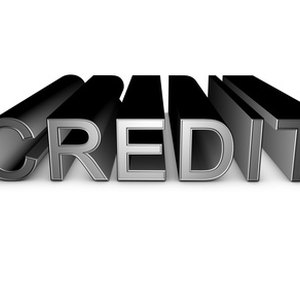
Credit cards are a part of everyday American life. Consumers use credit cards for shopping online, booking hotel and car reservations and dining out. Each credit card comes with its own set of features that help consumers choose which card will best fit their lifestyle.
Credit Limit
The credit limit on a credit card reflects the amount of credit extended to the credit card holder by the lender. Credit limits vary widely; some are as low as $300 for the First Premier subprime card and others, such as the Express Gold card from American Express, are unlimited. Lenders base the amount of credit a consumer receives on various factors, including income and credit history. According to Fair Isaac, inventors of the FICO scoring model, 35 percent of your FICO score is based upon how well you pay your bills. Exceeding your established credit limit by maxing out the credit card will negatively impact your score.
Interest Rate
Another feature of credit cards is the interest rate. This rate determines how much in finance charges you'll pay on the card's balance. Some credit cards come with 0 percent interest, such as the Platinum Prestige card from Capital One. That's the good news; the bad news is that some credit cards have interest rates that are significantly higher. First Premier Bank markets a credit card that has an interest rate of 79.9 percent. This card is geared towards those with bad credit. Generally, consumers with higher credit scores receive better interest rates.
Fees
Credit card lenders charge fees for certain occurrences associated with the use of a credit card. Lenders charge consumers a fixed fee if a late payment is made. For example, this fee is up to 38 percent for the Chase Freedom card. Another fee is the annual fee, which the cost of owning the card. Lenders also once charged an over-the-limit fee to consumers but the Credit Card Accountability, Responsibility and Disclosure Act (CARD Act) of 2009 now prohibits credit issuers from allowing consumers to go over their credit limit unless the consumer opts-in. If you do opt-in and go over the credit limit, the credit issuer is allowed to charge a fee.
Grace Period
The grace period is the amount of time you have to pay your bill fin full without incurring finance charges. This is usually measured in terms of days. If you always pay your balance in full each month, you avoid the finance charge altogether. Some cards, such as the Applied Bank Visa, don't have a grace period at all. This is important because it means that interest is applied right away, which guarantees that the consumer will incur finance charges even if the balance is paid in full.
Rewards
Depending upon the card, there are various rewards that consumers can enjoy. Some rewards are in the form of points, which are used to make purchases at certain merchants. Other rewards include airline miles and merchandise discounts and cash back offers, which pays consumers in cash a percentage of the amount they charged on the card within a certain time frame. The Discover More card has a cash back offer of 5 percent.
References
- Capital One: Platinum Prestige Card
- Huffington Post: Your request is being processed... 79.9 Percent Interest Credit Card From First Premier Bank Skirts New Regulations
- Debt.org. "Revolving Credit: What It Is & How It Works." Accessed May 17, 2020.
- Federal Trade Commission. "Using a Credit Card." Accessed May 17, 2020.
- Experian. "What Are the Different Types of Credit Cards?" Accessed May 17, 2020.
- Experian. "What is a Good Credit Score?" Accessed May 17, 2020.
- Consumer Financial Protection Bureau. "How to Find the Best Credit Card." Accessed May 17, 2020.
- Experian. "What is a Cash Advance?" Accessed May 17, 2020.
- USA.gov. "Credit Cards." Accessed May 17, 2020.
- Experian. "How to Avoid Foreign Transaction Fees." May 17, 2020.
- Experian. "Balance Transfer Credit Cards." Accessed May 17, 2020.
- Experian. "What Is APR and How Does It Affect Me?" Accessed May 17, 2020.
- Experian. "What Is a Rewards Credit Card?" Accessed May 17, 2020.
- Experian. "Going Over the Limit on Your Credit Card." Accessed May 17, 2020.
- Experian. "Will Closing a Credit Card Hurt Your Credit?" Accessed May 17, 2020.
- Federal Trade Commission. "Protecting Against Credit Card Fraud." Accessed May 17, 2020.
Writer Bio
Mack Mitzsheva is a tax lawyer, personal finance expert and the author of the forthcoming ebook, "10 Best Places to Work Online." Mitzsheva is also a social media entrepreneur with five successful sites under her belt. Always innovative, Mitzsheva is currently developing a cutting-edge budgeting app for newlyweds.

